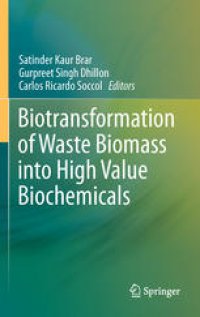
Ebook: Biotransformation of Waste Biomass into High Value Biochemicals
- Genre: Biology // Microbiology
- Tags: Waste Management/Waste Technology, Biotechnology, Plant Breeding/Biotechnology
- Year: 2014
- Publisher: Springer-Verlag New York
- Edition: 1
- Language: English
- pdf
Agro-industrial wastes are end-products emerging after industrial processing operations and also from their treatment and disposal e.g. solid fruit wastes and sludge. The agro-industrial wastes are often present in multiphase and comprise multicomponent. Nevertheless, these wastes are a goldmine as they possess valuable organic matter which can be diverted towards high value products ranging from polymers to antibiotics to platform chemicals. There have been plenty of books published on bioenergy, enzymes and organic acids, among others. However, this emerging field of biochemical has not yet been covered so far which is an important entity of the biorefinery model from waste biomass and needs to be understood from fundamental, applied as well as commercial perspective which has been laid out in this book.
Agro-industrial wastes are end-products emerging after industrial processing operations and also from their treatment and disposal e.g. solid fruit wastes and sludge. The agro-industrial wastes are often present in multiphase and comprise multicomponent. Nevertheless, these wastes are a goldmine as they possess valuable organic matter which can be diverted towards high value products ranging from polymers to antibiotics to platform chemicals. There have been plenty of books published on bioenergy, enzymes and organic acids, among others. However, this emerging field of biochemical has not yet been covered so far which is an important entity of the biorefinery model from waste biomass and needs to be understood from fundamental, applied as well as commercial perspective which has been laid out in this book.
This book will be practical and must-have for academicians, researchers, graduate students and industry scientists working in the fields of Industrial microbiology, biotechnology, Bioprocess Technology, Waste Management and the Food Industry.
The book covers different biochemicals:
- such as bioactive secondary metabolites; functional food products, pharmaceutical compounds and others;
- includes the general concepts of pre-treatment and carbon sequestration which are fundamental to their complexity and value-addition;
- examines thoroughly the production and cost-economics approach, wherever the biochemical has been commercialized. <
Further, the book chapters have been prepared in a lucid manner edited and revised by a team of expert editors, namely Dr. Brar who has been working in the field of bioprocessing of waste biomass for the past 15 years; Prof. Soccol, a well-known expert in the field of fermentation and bioproducts for over 30 years and Dr. Dhillon who has been researching the diverse gamut of biotransformation to biochemicals for the past 10 years.
Given the simple manner of presentation of production of different biochemicals from waste biomass under the edition of three biotechnological experts in tandem with the diverse audience that the book addresses, it’s a haven for biorefinery protagonists.
Agro-industrial wastes are end-products emerging after industrial processing operations and also from their treatment and disposal e.g. solid fruit wastes and sludge. The agro-industrial wastes are often present in multiphase and comprise multicomponent. Nevertheless, these wastes are a goldmine as they possess valuable organic matter which can be diverted towards high value products ranging from polymers to antibiotics to platform chemicals. There have been plenty of books published on bioenergy, enzymes and organic acids, among others. However, this emerging field of biochemical has not yet been covered so far which is an important entity of the biorefinery model from waste biomass and needs to be understood from fundamental, applied as well as commercial perspective which has been laid out in this book.
This book will be practical and must-have for academicians, researchers, graduate students and industry scientists working in the fields of Industrial microbiology, biotechnology, Bioprocess Technology, Waste Management and the Food Industry.
The book covers different biochemicals:
- such as bioactive secondary metabolites; functional food products, pharmaceutical compounds and others;
- includes the general concepts of pre-treatment and carbon sequestration which are fundamental to their complexity and value-addition;
- examines thoroughly the production and cost-economics approach, wherever the biochemical has been commercialized. <
Further, the book chapters have been prepared in a lucid manner edited and revised by a team of expert editors, namely Dr. Brar who has been working in the field of bioprocessing of waste biomass for the past 15 years; Prof. Soccol, a well-known expert in the field of fermentation and bioproducts for over 30 years and Dr. Dhillon who has been researching the diverse gamut of biotransformation to biochemicals for the past 10 years.
Given the simple manner of presentation of production of different biochemicals from waste biomass under the edition of three biotechnological experts in tandem with the diverse audience that the book addresses, it’s a haven for biorefinery protagonists.